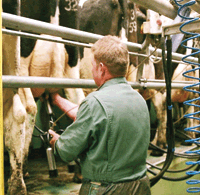Wages Board order adds to farmers’ costs

Wages for farmworkers in England and Wales will rise by almost 3% this year, after the Agricultural Wages Board announced its order.
The AWB has imposed a settlement of 2.9% on grades two and above, and a significant 2.5% increase on grade one, keeping it 2p over the National Minimum Wage. But the NFU says it’s disappointed with the outcome.
An NFU statement said: “While below inflation, the settlement is above the current average of wage settlements currently being agreed in the wider economy. It is also greater than both the National Minimum Wage increase and the recent agreement for agricultural workers in Scotland. Yet again, England and Wales face a larger increase in Agriculture Wages Order rates than the 2.5% settlement that was agreed in Scotland.”
NFU lead negotiator Bob Fiddaman said: “The industry is already struggling to manage higher costs for a range of inputs. On top of that, many farmers are experiencing difficult crop conditions following the drought which will create further financial uncertainty as we look to the settlement period.
“This is a tough outcome and I am disappointed that we were unable to persuade the AWB of the rising input costs faced by the industry over the past months. The National Minimum Wage increase applicable to other sectors would have been fairer overall, and particularly in view of the difficult growing conditions in the eastern counties.
“We will continue to question why farming should be singled out as a sector by the presence of a unique and separate legislative structure that underpins wage bargaining and employment terms. We look forward to confirmation of the timeframe regarding the abolition of the AWB.”
DEFRA announced in 2010 its intention to abolish the AWB in England and Wales, bringing farmworkers into the scope of the National Minimum Wages Act. But the legislation that would enforce this – the government’s Public Bodies Bill – has not yet reached the statute book.